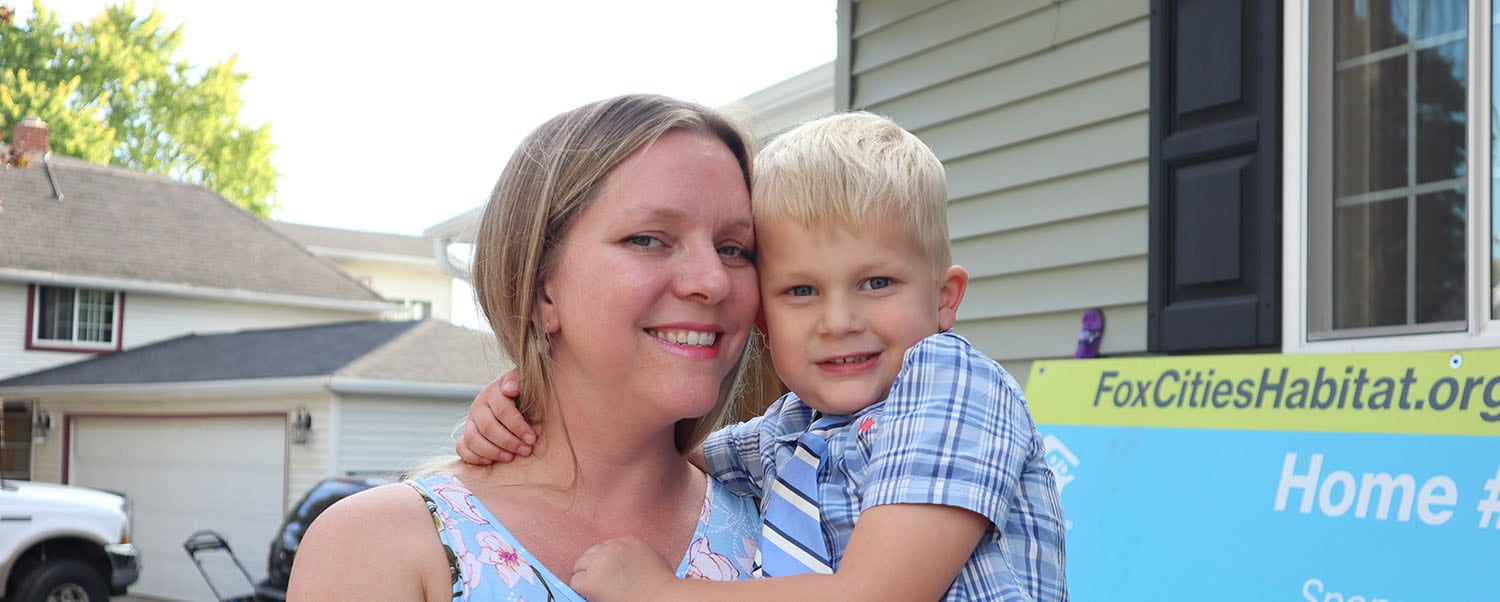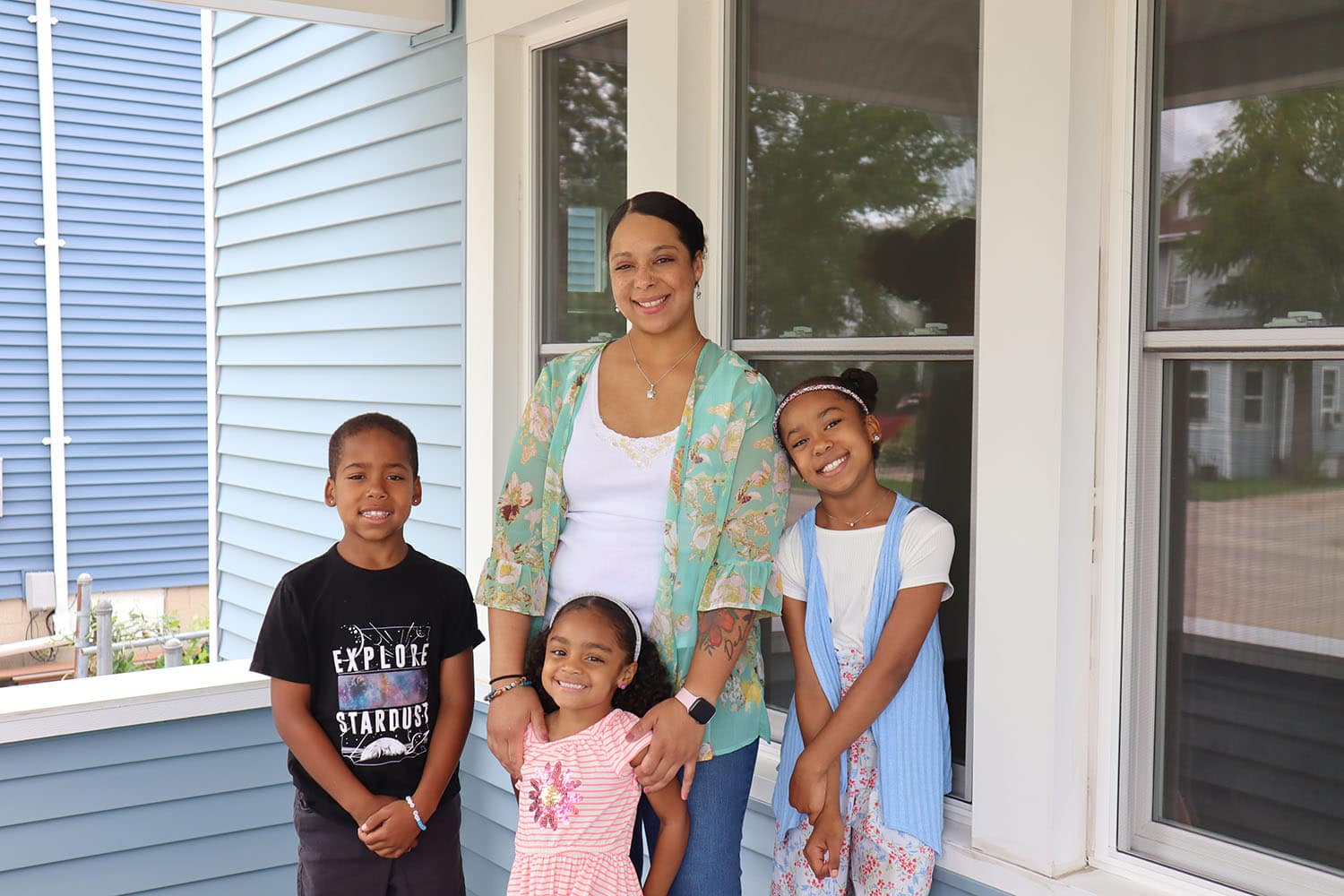- Who We Are
- Our Programs
- Our mission is to empower families to gain access to decent, safe and affordable housing. This mission is fulfilled by partnering with families to become homeowners or improve the safety of their existing homes.
- Homebuyer
- Home Repair
- Almost Home
- Free Lead Remediation
- Rock the Block
- Global Support
- Construction Resources
- Homeowner Resources
- How You Can Help
- ReStore

Health, Wealth, and Peace Through Homeownership
Posted on April 3, 2024
Health, Wealth, and Peace Through Homeownership
“Thanks to our new home, I’m more confident than ever that my children will be able to chase their dreams.”
– Alexis Shultz, Habitat Homeowner

Building Wealth and Financial Stability
Owning a home can be a ticket to financial security. Research shows that U.S. homeowners have a net wealth that is 400% higher than that of renters with similar demographics and earnings. Home equity, which accounts for 34.5% of wealth for all U.S. households, provides families with a stable foundation for their financial future. Studies have also shown that each year of homeownership adds approximately $9,500 to a family’s net wealth!
These factors are significantly more pronounced for families in Habitat homes. Habitat mortgages are capped at 30% of a household’s income, and this is paired with a no-or-low interest loan. This allows families to build equity (wealth) quickly instead of primarily paying interest for the first 5-10 years of a traditional mortgage with market-rate interest.
Finally, a new Habitat home is an efficient home. Beyond the mortgage and property taxes, heating and cooling can be a worrisome expense; especially for lower-income families. Using today’s standards for an energy efficient home, Habitat homeowners are able to save additional dollars that can be invested in other critical areas for their families.
Empowering Education
A stable home environment helps set children, and adults, up for educational success. Children of low-income homeowners are 11% more likely to graduate from high school and 4.5% more likely to complete post-secondary education compared to those growing up in rental housing. Instead of paying 40%, 50%, or even more of their income towards housing, Habitat homeowners can take advantage of a lower stable payment to set aside funds to support their children’s educational goals. For lower-to-moderate income households, a $10,000 increase in wealth raises the probability of college attendance by 14%.
Improving Health and Well-being
Having stable and good-quality housing is vital. Homeowners tend to have fewer housing repair needs compared to renters. Improving housing conditions can positively affect overall health – both physically and mentally. Homeownership also provides safety and stability since families have their own space that is always there for them.
Unstable housing for families with children can lead to significant increases in health and educational costs. Lowering housing costs for struggling families means they have the ability to spend more on essentials such as food, education, and healthcare. This gives families the chance to focus on their health without having to worry about their next move.
Improving housing quality has been recognized by the U.S. Centers for Disease Control and Prevention as an effective strategy to enhance overall health, respiratory health, mental well-being, and reduce the risk of injuries. Additionally, stable housing helps prevent overcrowding, which in turn minimizes the spread of respiratory infections.
Growing Independence and Creating Community
Homeownership doesn’t just create more financial freedom, it also brings a sense of independence and responsibility. Homeowners no longer have a landlord or neighbors on the other side of the wall. They have the freedom to decorate, paint, plant a garden, landscape, and make their home their own.
Children are more comfortable to have sleepovers, play loud music, and dance in their living room without the fear of making too much noise – they can fully embrace being a kid. They are provided healthy space to grow and learn, while also having the freedom to be themselves and chase their dreams.
Investing in a home can also lead to investing in a community. Homeowners are more 30% more likely to engage in their community and local activities such as voting and participating in neighborhood groups compared to renters.
If you’d like to support our efforts and play a part in the long-term impact, please visit our volunteer or donate pages.
Source: Habitat for Humanity International Evidence Brief: https://www.habitat.org/our-work/impact/research-series-outcomes-associated-with-homeownership